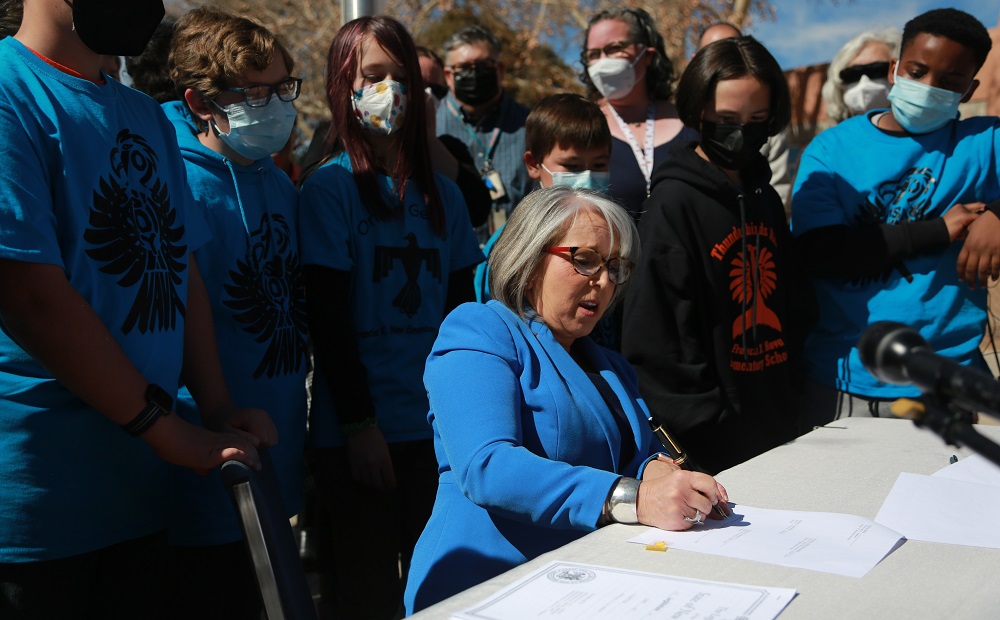SANTA FE, N.M. (AP) — New Mexico will begin to offer equal pay to dozens of Indigenous language teachers as part of a new law aimed at improving K-12 education for Native American students and preserving their languages and cultures.
A bill signed into law Thursday counts educators who are certified in the Indigenous languages taught in public schools and spoken by New Mexico’s 23 tribes and pueblos as entry-level teachers eligible for the state’s minimum salaries.
Earlier this week, the state raised the minimum teacher salary to $50,000 for a nine-month contract, up from $40,000. Together, the new measures will ensure that some 155 Indigenous language certificate holders will be paid at least that much if they have a teaching contract. Paid as “teaching assistants,” some had been earned as little as $14,000.
“The teachers who carry on this integral piece of the culture and history of so many in our state deserve to be paid as the educational professionals they are,” said Democratic Gov. Michelle Lujan Grisham.
The bill signing comes as Lujan Grisham’s administration fights a decade-old lawsuit brought by parents of underserved students, including Native Americans.
A plan to address the lawsuit, which ruled against her in 2018, hasn’t been released. Tribal leaders said in October that they hadn’t been consulted as promised.
Around 11% of New Mexico students are Native American. Public and tribal schools in New Mexico teach eight native languages, including Zuni and Navajo, with language teachers certified through a process run by tribal authorities.
Those tribal language certificate holders are qualified to track in K-12 schools but haven’t been eligible for minimum salary protections enjoyed by traditional teachers who complete a four-year university degree in subjects like English or Spanish. Universities don’t offer degree programs for most tribal languages.
While at least one school district in New Mexico voluntarily paid the language teachers equitably, there was no minimum salary, and some made as little as $14,000 per year as teaching assistants despite performing the work of a teacher, like planning lessons, developing curriculum and leading classrooms.
“This is a watershed moment for Native language teachers,” said Rose Chavez, a Keres teacher at Bernalillo High School and a member of nearby Kewa Pueblo. “I feel very honored and praised.”
Chavez’ boss at the high school started offering her equal pay in recent years and spoke publicly in support of the changes this year.
Native American leaders welcome the new law but say the governor has more work to do.
“I can appreciate her signing the bill, but I wish that the administration would be much more of a contributor,” said Rep. Derrick Lente, of Sandia Pueblo, who sponsored the legislation. “Our students will be able to be taught their native tongue by the experts within our own communities.”
Native American advocates have described recent efforts by the state to address Native American students as a piecemeal approach. They welcome increased teacher pay, as well as changes to the social studies curriculum.
But Indigenous students still lag behind their peers in internet and technology access and are more likely to attend schools that have lacked equal access to funding for buildings for decades.
“The tribal folks push but a lot of their efforts fall to the wayside,” Lente said.
Lujan Grisham also signed a law codifying federal protections for Native American children in foster care. The law gives tribes the right to intervene on behalf of their members and prioritizes adoptions with fellow tribal members. The federal protections are being challenged in the U.S. Supreme Court.
___
Attanasio is a corps member for the Associated Press/Report for America Statehouse News Initiative. Report for America is a nonprofit national service program that places journalists in local newsrooms to report on under-covered issues. Follow Attanasio on Twitter.
































